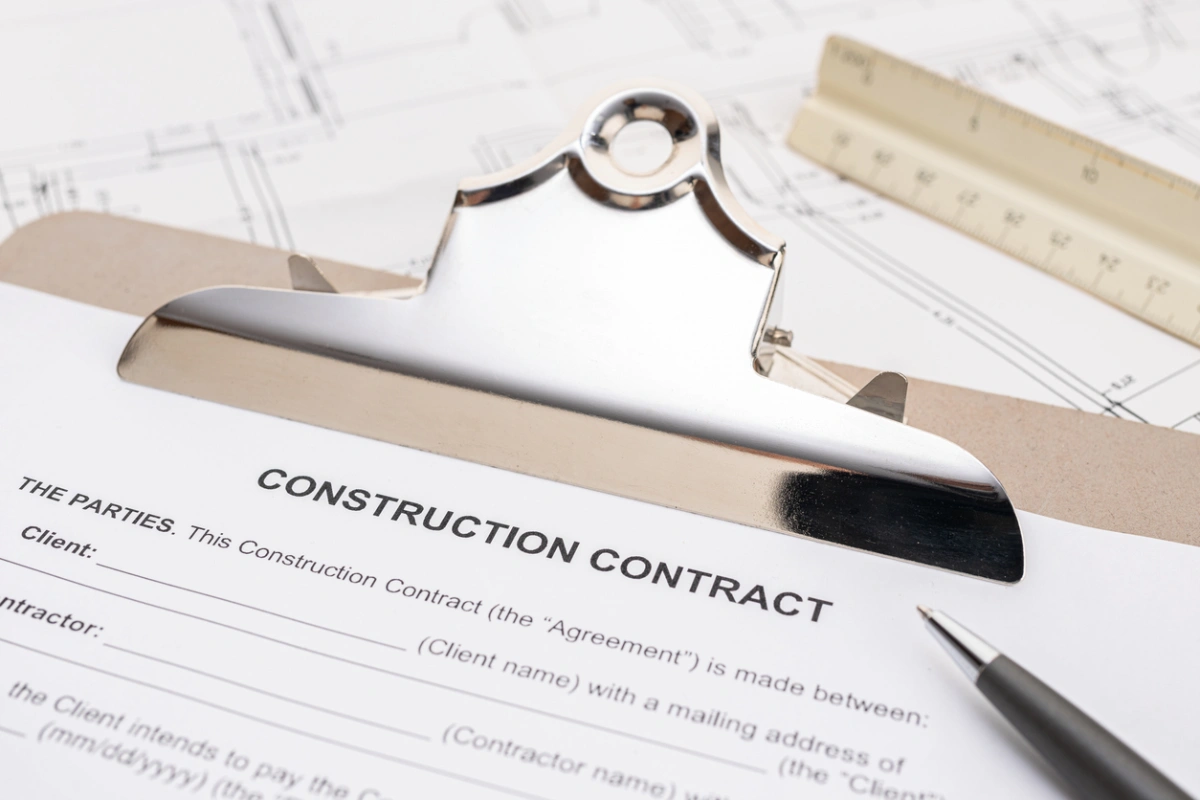
Terminating a construction contract can be one of the most stressful decisions to make. It’s not just about ending an agreement. It’s about protecting your time, money, and the future of your project. If things aren’t going as planned—whether due to delays, disputes, or poor performance—you might find yourself wondering how to terminate a construction contract and if contractual termination is your best option.
Does this sound familiar? Maybe your contractor hasn’t met their deadlines, or there’s been a complete breakdown in communication. Or perhaps the work being done doesn’t match what you agreed on. These scenarios are more common than you might think, and knowing how to address them legally is essential.
At Estavillo Law Group, we understand how challenging this process can be because our attorneys help clients resolve conflicts that arise during the construction process. We’ve prepared this guide to break down the process step by step, from understanding when and how termination can occur to preparing for the consequences.
Understanding Construction Contract Termination
Terminating a construction contract isn’t as simple as just walking away. Contract termination is a complex process that requires careful consideration of contractual obligations and termination clauses. Failing to follow the correct procedures can lead to serious legal and financial problems.
There are many reasons why a construction contract might need to end. A construction contract can be terminated due to various reasons, including material breach, failure to fulfill contractual obligations, or changes in circumstances. Each of these situations has its own legal requirements, which makes understanding your rights essential.
But do you know what your contract says about termination? Understanding the termination process is crucial to avoid legal issues and costs incurred. This means reviewing termination clauses, documenting issues, and following proper notice procedures. Taking these steps can save you from construction contract disputes and unexpected expenses later.
Common Reasons for Terminating a Construction Contract
Construction contracts are designed to protect both parties, but issues can still arise. In some cases, termination becomes the only viable solution to move forward. Here are the most common reasons why a construction contract might end:
- Material breach of contract, such as poor workmanship or failure to meet quality standards, can jeopardize the entire project and create serious financial risks.
- Failure to fulfill contractual obligations, including delays or non-payment, occurs when one party fails to deliver on agreed terms, trust breaks down, and termination may become necessary.
- Changes in circumstances, such as changes in local zoning laws or building codes, can force parties to reconsider the agreement.
- Disagreements between parties, including disputes over project scope or quality, can make collaboration unworkable, stall progress, and waste resources.
- Financial difficulties of one party, such as bankruptcy or insolvency, can render the agreement unviable due to the party’s inability to meet their financial commitments.
- Safety concerns or regulatory violations may also result in termination of a construction contract when doing so is necessary to protect workers and comply with the law.
Understanding these reasons can help you determine if construction contract termination is appropriate for your situation.
How to Prepare for Contract Termination
Preparing to terminate a construction contract is not easy and requires a clear plan of action. If you don’t stick to any plan, you risk jeopardizing your interests and running into disputes. Here’s how you can prepare when thinking about terminating a contract:
- Reviewing the contract: Carefully review the construction contract to understand termination clauses and notice requirements. This will help you know when and how you can legally terminate the agreement. Missing a required step or deadline could lead to costly legal issues.
- Documenting: Document any problems or issues with the project, including photographs and written documentation. Record missed deadlines, subpar work, or safety concerns. Detailed evidence strengthens your position and provides clarity if disputes arise later.
- Consulting with experts: If you’re uncertain about the validity of your concerns, consult with a neutral third party, such as a construction expert, to determine if complaints are legitimate. An expert can provide unbiased insight into whether the issues justify termination.
- Working with an attorney: Meet with experienced construction attorneys to discuss legal options. They can help you navigate the termination process, ensure compliance with contract terms, avoid unnecessary legal risks, and communicate with the other party professionally.
- Notifying the other party: When you’re ready to proceed, notify the contractor in writing, providing a detailed explanation of the reasons for termination. Written notice ensures transparency and creates a record of your actions. Be specific about the breaches or issues leading to this decision.
- Following the proper termination process: Follow the termination process outlined in the contract, including notice periods and termination provisions. Adhering to the agreed terms prevents claims of wrongful termination and protects your legal standing.
- Obtaining liens and securing the site: Before finalizing the process, obtain lien releases from all general contractors and suppliers who have worked on the project. This step safeguards against future financial claims or disputes over unpaid work. Additionally, secure the site to prevent any further work or damage to the property to minimize risks and prepare for the next phase of your project.
Remember, termination is a serious step, but with the right preparation, you can protect your project and avoid unnecessary complications. If you’re ready to get started, our construction contract termination lawyer at Estavillo Law Group is here to help.
Ways to Handle Construction Contract Termination
Whether you prefer resolving the matter amicably or pursuing legal action, you need to understand your options. Here are some approaches to consider.
1. Negotiation and Mediation
Negotiation is often the easiest and most cost-effective way to terminate a construction contract. By discussing terms directly with the other party, you may avoid expensive legal battles. This approach works best when both parties are willing to cooperate.
If direct negotiation doesn’t work, mediation is a form of alternative dispute resolution (ADR) that involves a neutral third party. A mediator helps both sides communicate and work toward an agreement. Consider hiring a mediator to help resolve disputes and negotiate a termination agreement. This approach can save time and preserve relationships when handled professionally.
2. Litigation and Arbitration
When peaceful solutions fail, legal action may be necessary. Litigation involves filing a lawsuit against the contractor in court. This process can be lengthy and expensive but may be required if the contractor refuses to cooperate or resolve the issues.
Alternatively, arbitration is also an ADR method that involves submitting a dispute to one or more arbitrators (who are neutral third parties) for a final and binding decision. Arbitration is often faster than litigation and may offer a less formal process. Consider hiring a construction attorney to represent you in court or arbitration. A skilled lawyer ensures your case is presented in a manner that best advances your interests.
Post-Termination Steps
After terminating a construction contract, proper follow-up is essential to avoid further complications:
- First, document everything related to the project, including correspondence and agreements. Keep a record of emails, letters, invoices, and any communication with the contractor.
- Obtain a termination letter from the contractor, confirming the termination of the contract. A written confirmation ensures there is no confusion about the end of the agreement.
- Review the contract to determine if there are any fees or penalties for terminating the contract early. Some contracts include termination fees, which you’ll need to address before proceeding.
Taking these steps ensures a clean and organized closure of your contract. If you’re unsure how to terminate a construction contract in California and what to do after the contractual termination, our lawyers at Estavillo Law Group can guide you through the entire process.
Consequences of Termination of Construction Contracts
Terminating a construction contract can have significant legal and financial consequences, and many people aren’t prepared for them. Here’s what might happen:
- Financial liability, which may include termination fees, unpaid invoices, or damages claimed by the other party.
- Legal disputes if the terminated party decides to challenge the termination, claiming wrongful dismissal or breach of contract.
- Project delays while finding a new contractor and restarting work takes time.
- Strained professional relationships, which are likely to complicate future dealings with the other party.
By understanding these consequences, you can prepare for potential challenges and decide if termination is truly the best path forward for your project.
Seeking Professional Advice from Construction Attorneys on Contract Termination
If you’re thinking of ending a construction contract, you’re probably under a lot of stress right now. You’re likely juggling delays, mounting frustrations, or unmet expectations, all while trying to protect your investment. This is not a decision you want to take lightly—and you shouldn’t have to face it alone.
Are you sure that your reasons for termination will hold up legally? You might want to consult with Estavillo Law to discuss legal options and negotiate a termination agreement. We’ll work with you to uncover the clearest, most cost-effective solution for your specific situation.
Sometimes, the issues go deeper than what’s visible on the surface. You need someone who can analyze the facts and offer a fresh, impartial perspective. Hire Estavillo Law to provide an unbiased assessment of the project. We’ll help you determine whether termination is the right path—or if there are better ways to resolve the situation.
We understand this decision comes with real consequences—financial, emotional, and practical. That’s why we’re here to listen, guide, and support you. Schedule a free consultation with a construction attorney to discuss your case. You deserve answers, a solid plan, and peace of mind knowing your rights are protected. Call at (510) 982-3001 or contact us online today.


